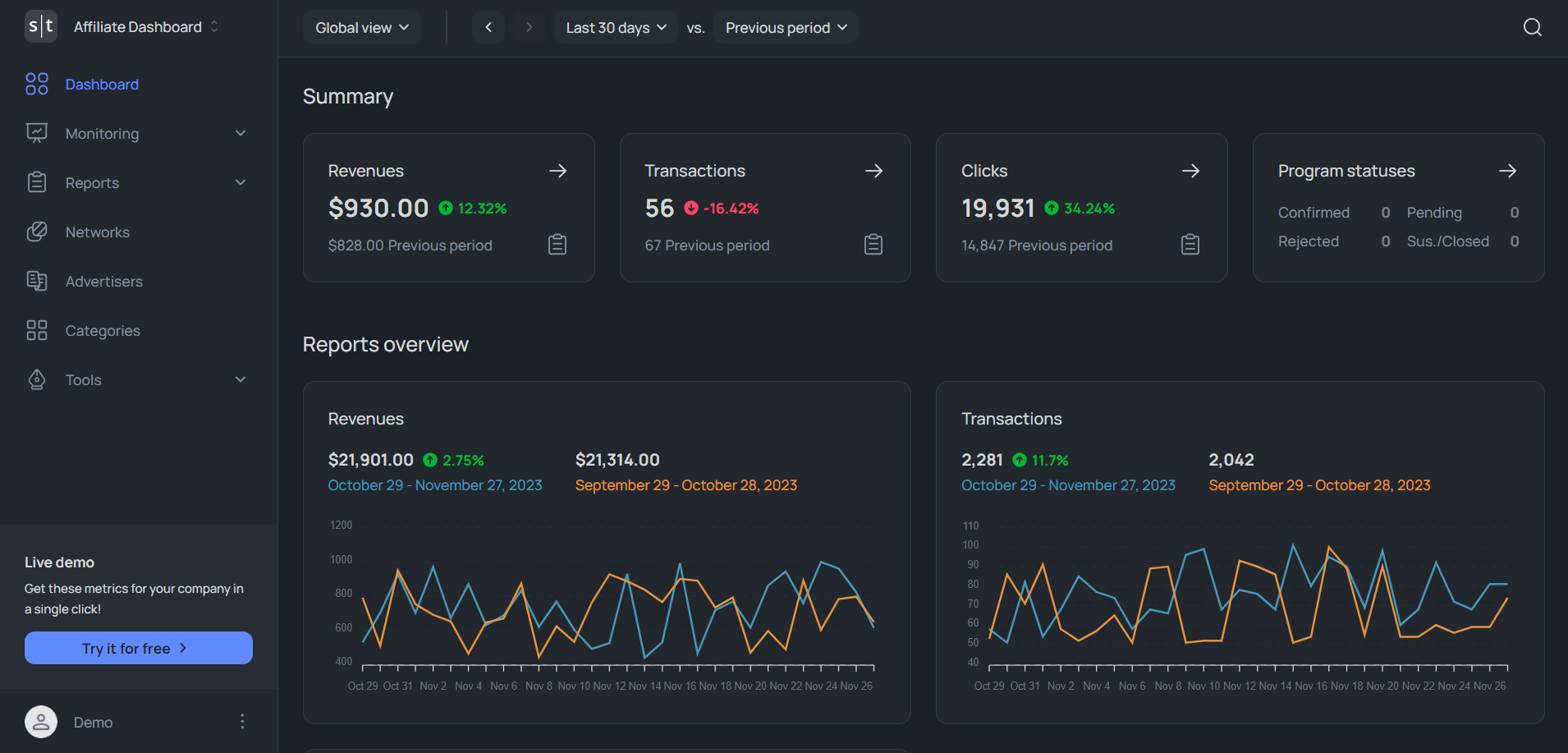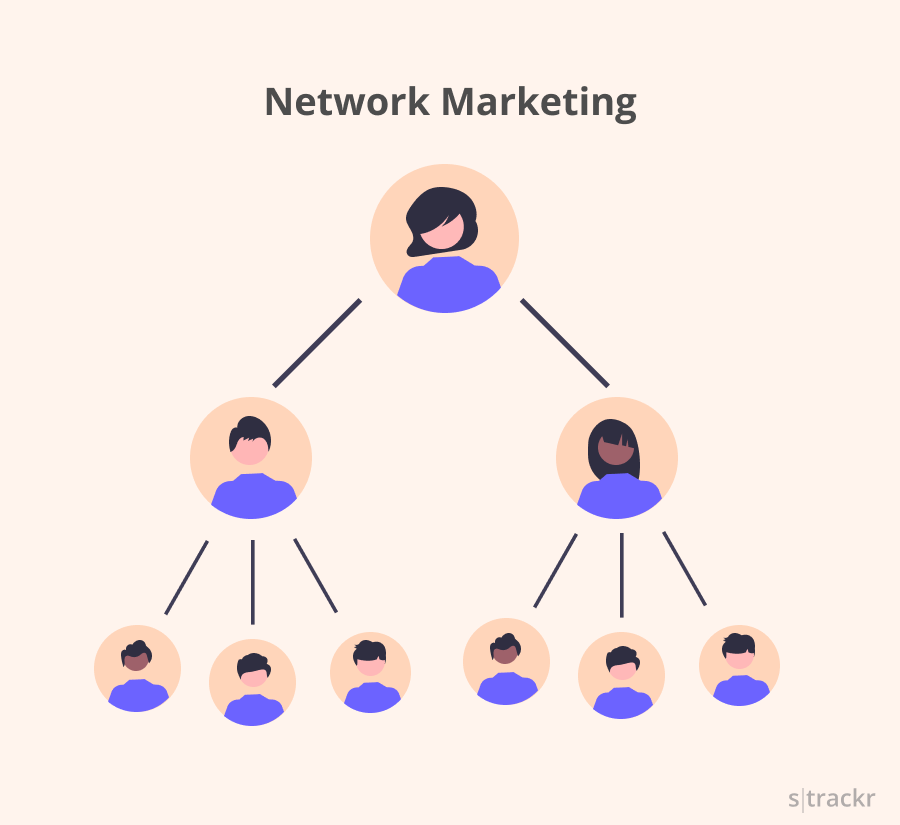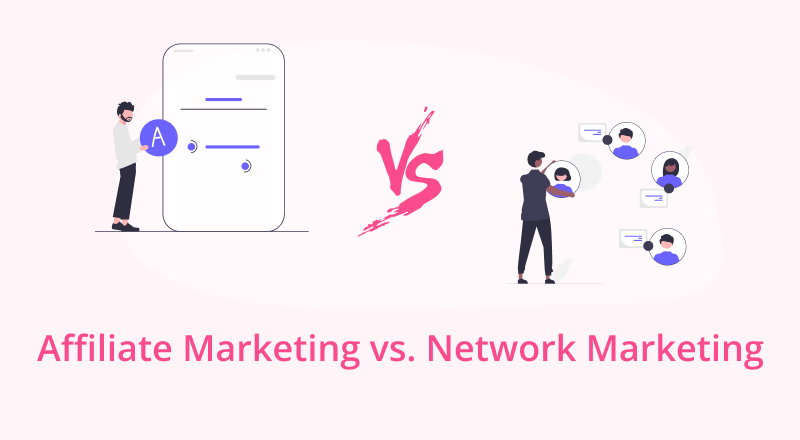Table of contents
In the ever-evolving landscape of digital marketing, two stars are emerging: affiliate marketing and network marketing. Each has their unique business model and approach to help you generate income, so you may be unsure of which one will help you achieve your goals.
Whether you're a seasoned entrepreneur taking your business to the digital frontier, or a novice looking to make your first mark on the online marketplace, understanding these two strategies is essential for your growth.
So buckle up, in this Strackr guide, we’ll dissect affiliate marketing and network marketing, and help you decide which may be the best fit for your needs.
Affiliate Marketing vs Network Marketing: Overview
In the dynamic world of marketing, trends come and go. Currently, affiliate marketing and network marketing are making waves. The network marketing industry reached a staggering $189 billion in 2021, growing at a 6.1% CAGR. Meanwhile, affiliate marketing is valued at $17 billion. It’s pretty clear that both approaches can offer ample opportunities.
Affiliate marketing involves promoting products online for commissions, while network marketing relies on direct sales through distributors. Affiliate marketing is cost-effective, flexible, and offers higher commission potential.
On the other hand, network marketing provides residual income and sales team support. Choosing between the two depends on goals, experience, and preferences. It’s best to consider the pros and cons of each before deciding.
What Is Affiliate Marketing?

Affiliate marketing is a performance-based online marketing strategy where affiliates earn commissions by promoting products or services through unique referral links. As shown in the image above, affiliate marketing can be seen as a dynamic business cycle that thrives on the symbiotic relationships between influencers and businesses.
For instance, a fashion blogger can collaborate with an online clothing store and leverage tracking links to promote their products on social media platforms such as Facebook, even without initial capital.
When a blogger’s audience makes a purchase through these links, they earn a commission. This mutually beneficial arrangement allows affiliates to earn income and merchants to increase sales through third-party promotion. In affiliate marketing, affiliates search for products they enjoy, promote them, and earn a share of the profits from each sale. The sales are tracked via affiliate links between websites.
Affiliate marketing revolves around the strategic and targeted online advertising of products and services, where customers are enticed to make purchases and actively engage with the ads. By leveraging the power of digital platforms, affiliate marketing offers a win-win situation for both influencers and businesses, creating a mutually beneficial ecosystem that drives brand awareness, customer acquisition, and revenue growth.
How Does Affiliate Marketing Work?
Affiliate marketing is a strategy where affiliates promote a merchant's products or services and earn a commission for each sale or specific action. Here's how it works:
- Affiliate Marketer (Publisher): These are individuals or businesses that promote products using channels like social media, blogs, emails, and more. They create content like reviews and tutorials to promote products and embed their affiliate links.
- Merchant (Advertiser or Seller): These are companies or individuals that own or sell products. They create affiliate programs to incentivize affiliates to promote their products.
- Affiliate Networks: These are platforms that connect affiliates with merchant programs, managing the relationship between them. They handle tracking, reporting, and payment processing.
Strackr is a reliable platform to help you. With one dashboard and one API, you can easily handle multiple networks, manage API changes, and update your data efficiently.

- Customers: These are the end-users who purchase products or services through affiliate links. Their purchases generate commissions for affiliates.
This collaborative process drives affiliate marketing, benefiting all involved parties.
Examples of Affiliate Marketing
1. Amazon Affiliate Marketing
Amazon Associates is one of the largest affiliate marketing programs, where creators, publishers, and bloggers promote Amazon products and receive compensation for generating sales.
2. Leadpages
Leadpages offers tools for businesses to create, optimize, and track landing pages and lead forms. Affiliates can earn competitive commissions of up to 50% by promoting Leadpages' lead generation tools.
3. Buzzfeed
Buzzfeed is a digital media company known for viral news and entertainment. Through its Buzzfeed Shopping segment, it features and reviews products and services from different partners, earning commissions from sales generated through affiliate links.
Pros and Cons of Affiliate Marketing
Pros
- Passive income
- Flexible
- Low/no startup costs
- No need to create products
- Learning opportunities
Cons
- High competition
- Limited control
- Dependence on merchant
- Lack of control over customer experience
- Dependence on Search Engine Rankings
What Is Network Marketing?

Network marketing, also known as multi-level marketing (MLM), is a business model where independent representatives sell products through person-to-person sales. It often involves working from home and building a network of business partners or salespeople.
Some network marketing companies are reputable, but others have been criticized as pyramid schemes. These schemes focus on recruiting salespeople and may require upfront payments for expensive starter kits. Instead of employing a full-time sales staff, network marketing companies rely on individual sales professionals who purchase products in bulk and sell them on their own.
Before joining a network marketing company, it's important to research its structure to ensure you can profit from it.
How Does Network Marketing Work?
- Basic Concept and Structure: Network marketing relies on person-to-person sales and building a team of distributors to expand the customer base. Companies sell products through independent distributors who earn commissions on their sales and the sales of their team. This model is often associated with multilevel marketing, referral marketing, and consumer direct marketing.
- Getting Started: To start in network marketing, individuals typically sign up with a company and receive a starter kit with promotional materials and supplies. They usually work under a sponsor who provides education and guidance.
- Advantages and Flexibility: One of the main advantages of network marketing is the flexibility it offers. Distributors often work from home, make their own hours, and have autonomy without the responsibilities of starting a company. They also develop valuable skills such as making connections, persuasive presentations, and team leadership.
Examples of Network Marketing
1. Tupperware
Tupperware is a well-known multi-level marketing organization founded in the United States in 1938. It is associated with plastic food storage containers and holds approximately 40 Tupperware parties worldwide every minute.
2. Amway
As a successful MLM/network marketing company that has been in business for 57 years, Amway is the world's largest network marketing corporation, generating around $8.5 billion in revenue in 2020. With over 3 million representatives in over 100 countries, Amway sells health, beauty, and home care products.
Pros and Cons of Network Marketing
Pros
- Easy to start a business
- Flexible work hours
- Personal development
- Mentorship opportunities
- Unlimited earning potential
- Training and support by network marketing companies
Cons
- Depends on the individual's effort and time
- High pressure to recruit
- Negative reputation associated with scams and frauds
- Limited control over the business
- Difficulty in making sales
Key Differences Between Affiliate Marketing and Network Marketing
1. Start-Up Costs
Affiliate businesses usually have no start-up costs. You just need a computer and internet access. Content creation can be done for free using platforms like WordPress and YouTube, and joining an affiliate program is typically free. Expenses like website hosting or advertising are optional and scalable.
Often, network marketing requires an initial investment to join and may include ongoing fees for business tools and training. Distributors typically need to purchase a starter kit or product inventory. Total yearly costs can range from $1440 to $12,000 USD if you join a person-to-person sales business with a monthly subscription.
2. Earning Potential
Affiliate marketing offers flexible earning potential based on your efforts and audience size. Commission rates and program terms determine your specific earning potential. Thus, building a larger audience leads to more sales and increased income.
To prove this, architect Pat Flynn, after being laid off in 2008, capitalized on his website originally created for LEED exam study notes. By selling an ebook-style PDF guide, he quickly generated income and expanded into affiliate marketing and digital product sales. Through his blog, "Smart Passive Income," Pat documented his journey, building a loyal community with his transparent income reports. Pat's success includes podcasts, speaking engagements, online courses, and authoring multiple books.
Network marketing can provide decent income through effective recruitment and team building. However, beware of illegal pyramid schemes that promise income solely from recruiting others.
With nearly 30 years in network marketing, Eric Worre's net worth is around $40 million. He started as a distributor, became president of a large MLM company, and later started his own business. Now retired from active distribution, he coaches new recruits and has written a best-selling book, "Go Pro – 7 Steps to Becoming a Network Marketing Professional"
Essentially, network marketing can be a way to earn residual income if you're willing to sell products, recruit, and build your social network.
3. Marketing Strategies
In affiliate marketing, promotion channels often include paid ads and organic content marketing through blogs and social media platforms.
With Strackr, your affiliate marketing strategies can reach new heights. By providing a centralized platform to manage 204 affiliate networks, Strackr simplifies the process of running paid ads and organic content marketing campaigns through blogs and social media platforms.

On the other hand, network marketing primarily relies on social marketing methods such as word of mouth and referral marketing.
4. Pool of Opportunities
There are numerous affiliate programs and profitable niches available, with popular ones including health and wellness, fashion, and gaming.
In contrast, MLM programs are more limited. While there are many affiliate products and opportunities to promote, building a network of marketers can be challenging.
5. Structure and Compensation
In affiliate marketing, affiliates earn commissions based solely on their own marketing efforts and the resulting sales or actions. This system offers more independence and flexibility without the need to build a team. Unlike traditional employees, affiliates are not bound by strict company guidelines or team dynamics. This allows them to tailor their approach and focus on promoting the offerings that align best with their target audience and personal interests.
In contrast, distributors in network marketing often work closely within the company's established structure. They follow specific guidelines and collaborate with their uplines, sponsors, downlines, and recruited team members. Distributors earn from their sales and those generated by their recruits. Therefore, success is tied to the ability to recruit and manage a team.
Start Your Affiliate Marketing Journey With Strackr
The vast digital landscape offers a multitude of methods for online entrepreneurship, such as affiliate and network marketing. These two contenders each propose unique business models and are vying for your commitment and success.
Armed with the knowledge from this guide, whether you're an experienced business person expanding to the digital realm, or a beginner stepping into the online marketplace for the first time, you should now be better prepared to navigate these two strategies.
And if you're looking for another way to achieve your goals, you can explore the incredible potential of affiliate marketing and unlock your path to success with Strackr.
Start your free trial now and experience the game-changing benefits of our platform. Maximize your earnings, track your performance, and elevate your affiliate marketing to new heights with Strackr. Don't miss out on this opportunity to revolutionize your business!
Sign up today and embrace a new era of growth!
Share
Affiliate dashboard

Connect all your affiliate networks with Strackr to access to unified statistics and tools.
Try for free